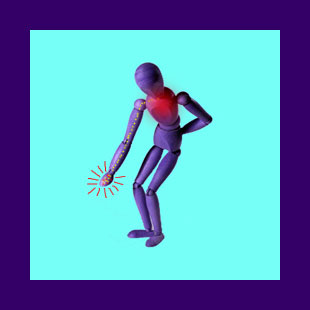
A tingling hand is a relatively common symptom that can be related to many different possible causations. The most common origins of tingling in the hands include disease processes, localized nerve anomalies, carpal tunnel syndrome, tendonitis, mindbody syndromes and compressive neuropathies in the neck or upper back.
The upper spinal nerve roots are responsible for providing neurological signals to the hands and are often implicated in creating tingling, weakness, numbness and pain felt in the arms, shoulders, hands and/or fingers. However, as noted above, there are many non-spinal sources of tingling in the hands, so comprehensive diagnostic testing should always be performed to narrow the suspected source to the fewest logical possibilities.
This dialog investigates the usual causes of paresthesia in the hands and provides affected patients with material to fuel their further research efforts towards successful treatment.
Tingling Hand Explained
Tingling, also called pins and needles or paresthesia, describes a condition wherein the neurological sensations in the appendage are abnormal and intermittent. Most patients will define their symptoms as differing from pain, but still being uncomfortable. In some instances, tingling will be the only symptom demonstrated. However, in many patients, the paresthesia might be accompanied by pain, numbness or weakness, as well.
In patients whose hand tingling is traced to spinal explanations, there may or may not be local symptoms in the back or neck, as well. About 85% of people who are diagnosed with hand paresthesia due to a pinched nerve do indeed suffer neck or upper back pain, stiffness and other regional expressions.
Tingling may involve the perception of heat, electrical jolts or other unique neurological sensations in some patients. Others will merely complain of a dull, intermittent pins and needles effect that might be acute and recurrent or might fall into a chronic pattern of constant symptomology.
Causes of a Tingling Hand
In relation to a spinal causation, hand paresthesia is most often diagnosed as coming from a pinched nerve in the neck or upper back. This process is called foraminal stenosis and describes a scenario where one or more spinal nerve roots are compressed as they exit the vertebral canal. In far less common cases, central cervical spinal stenosis might be blamed for eliciting tingling in the hands. Spinal stenosis can rarely also cause tingling in the hand, as can non-spinal neurological issues, such as thoracic outlet syndrome.
In the case of tingling as an exclusive expression, foraminal stenosis is rarely to blame, since continued compression of a spinal nerve will cause the structure to stop signaling altogether. The result is not lasting pain or tingling, but instead, is objective numbness and weakness. This symptomatic discrepancy can provide clues to possible misdiagnosis when treatments fail to bring about relief, despite resolution of the trapped nerve condition.
The most common mindbody causation of chronic tingling is certainly the purposeful oxygen deprivation process of either the spinal nerves or localized tissues. This is logical, since ischemia provides reduced oxygenation, enacting limited neurological response, as compared to a complete lack of signal demonstrated in anatomical compression instances.
Disease processes might be involved in the symptom-set, including diabetes and other types of pathological neuropathy.
A tingling hand might be a consequence of carpal tunnel syndrome or tendonitis. However, in most instances, pain will be the primary expression of both of these conditions, but this is not an absolute. It should be noted that a great number of tendonitis concerns are misdiagnosed as carpal tunnel, which explains why such drastic surgical methods of therapy often fail to bring about positive curative outcomes.
Finally, localized nerve trauma or irregularity might explain paresthesia in the hand or hands, especially if the patient has suffered some known injury to the region in the past that might leave residual nerve damage in its wake.
Coping with Hand Tingling
Tingling, just like any neurological symptom, can be difficult to accurately diagnose. Most patients discover this fact for themselves when they begin to seek treatment for their disconcerting symptoms. Doctors will have to perform a variety of tests in order to narrow down the likely sources of paresthesia in the hands. This may be a time-consuming process that may or may not lead to a definitive theory as to the actual causation of the expression.
Since tingling hands is a nerve symptom, we generally recommend seeking qualified care from a neurology professional. This advice will help patients to find the most direct route towards correct diagnosis and subsequent successful treatment.
For patients who already know the cause of their symptoms, but still require relief, there are many treatment options available, depending on the specific nature of the causative condition. While we can not advise on the best treatments for each and every possible cause, we can provide the following universal recommendations:
Never acquiesce to surgical correction of a suspected pinched nerve, unless the diagnosis is completely sound and all conservative care options have been thoroughly exhausted. Many neck and upper back surgeries are unnecessary and a great number fail due to misdiagnosis or other reason.
If the tingling is related to a spinal causation, there is a good chance that conservative or moderate care might provide equal or better results than surgery. The best modalities to investigate include chiropractic and nonsurgical decompression therapy, depending on the specific nature of the compressive neuropathy issue.
Finally, always be very careful with the diagnosis of carpal tunnel syndrome. Many cases are mistakenly identified and the surgical fixes can leave considerable collateral damage to healthy tissues.





